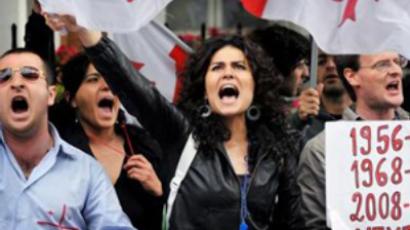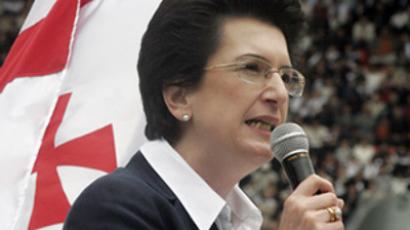ROAR: Saakashvili ready for monologue about Russia

The Georgian president sets his conditions for talks over “occupied territories” with Moscow as Russia rules out any dialogue with him.
Mikhail Saakashvili said on June 29 his country was ready for a dialogue with the Russian leadership, taking into consideration that Georgia is a single, sovereign and independent state.
Saakashvili also added that he was ready for talks with the former Georgian republics Abkhazia and South Ossetia. The normalization envisages the return of up to 500,000 Georgian refugees, he stressed.
Russia recognized the republics in August 2008, following Georgia’s aggression against South Ossetia. President Dmitry Medvedev recently said Moscow was ready to mend ties with Georgia after that country gets new leadership.
The Georgian president was speaking at an extended session of the National Security Council, attended by some opposition politicians. Saakashvili noted that the description of Abkhazia and South Ossetia as “occupied regions” by the US creates an “absolutely new reality.” He wants European countries and the EU to adopt this term in connection with those countries.
Analysts believe his statements will not change the situation in Russian-Georgian relations because Moscow will not deal with Saakashvili and will never accept the term “occupation”.
Saakashvili invited the opposition to discuss a new strategy towards Abkhazia and South Ossetia, called Engagement through Co-operation. Meanwhile, Zurab Nogaideli, an opposition leader and former prime minister, has visited Moscow for the eighth time since October 2009.
Nogaideli’s Movement for Fair Georgia party is developing relations with the ruling United Russia party. Although observers question Nogaideli’s influence in his country, he was discussing particular topics in Moscow, such as resuming regular flights between the two countries and Georgia’s exports to Russia.
The politician is also discussing the return of Georgian refugees to Khodory Gorge in Abkhazia and Akhalgorsky District in the South Ossetia.
Many in Georgia are getting “accustomed” to Nogaideli’s trips to Russia, Novye Izvestia daily said. “In any case, the reaction to his new contact with representatives of Russia’s political circles is not so sharp as before. Lately some Georgian politicians accused him of betraying national interests.”
Other Georgian politicians, including former parliamentary speaker Nino Burjanadze, also visit Moscow regularly. Many analysts believe that “by receiving Georgian opposition politicians, Moscow is gaining political support in that country,” the paper said.
However, some observers stress these politicians “have no Georgian mandate” to speak with Russia. Saakashvili may even use Nogaideli as “a scarecrow for the West,” Georgian political scientist Ivlian Khaindrava told Regnum news agency.
The Georgian leader positions himself as a man the West needs, because other leaders may come, wishing “to integrate into the Russian space,” he noted. Opposition does not present a threat to Saakashvili, but the threat might come from within the ruling force, the analyst said.
After Saakashvili’s second term of office expires, the fight for the right to succeed him may start, he believes. “Until the power is consolidated… it is difficult to make anything with it, he noted.
So far the Georgian opposition parties have failed to consolidate. They were defeated in the May 30 local elections by Saakashvili’s United National Movement.
After the elections, opposition alliances in Georgia broke up. Now the opposition parties will have to work independently, Nezavisimaya Gazeta daily said. The ruling party “cleared the political field” and no street protests are expected in the near future, it said. But the question is how long such a calm situation will last, the paper added.
The Georgian opposition has finally returned to the fragmented state, in which it started a protest movement in 2007, but the situation may be even worse, the daily said. Burjanadze “objectively assessed her strength and did not take part in the election,” it added. At the same time, the next opposition alliance may be formed around her, the paper assumed.
The Georgian leadership, meanwhile, has recently stepped up international contacts. US Secretary of State Hillary Clinton will review the results of the local elections and the progress of the relations between Tbilisi and Washington during her visit to Georgia on July 5.
Philip Gordon, the assistant secretary of state for European and Eurasian affairs, said, announcing Clinton’s tour, that a “better relationship with Russia does not come at the expense of our relationship with sovereign, independent countries that are near Russia.” The US continues calling on Moscow to allow international presence in Abkhazia and South Ossetia, Gordon said.
South Ossetian analyst Inal Pliev believes the demands to withdraw the Russian forces threaten the very existence of the people in South Ossetia.
Russian troops, stationed in the republics according to the bilateral agreements, are “maintaining peace,” Pliev told the South Ossetia government’s Res news agency.
The independence of South Ossetia “is based on former Soviet laws… as well as on international law,” the analyst said. “The statements against the independence of South Ossetia are inconsistent both from the legal point of view and common sense,” he stressed.
Sergey Borisov,
Russian Opinion and Analysis Review, RT














